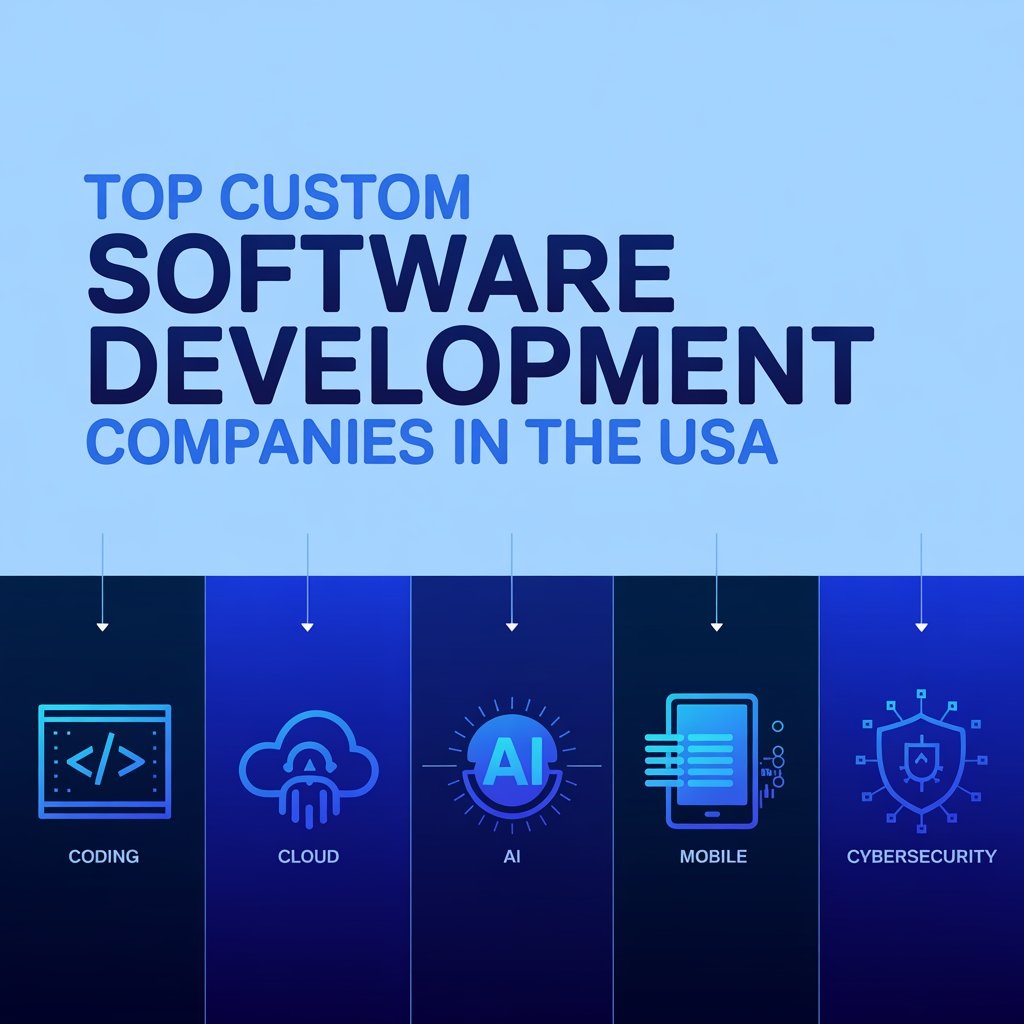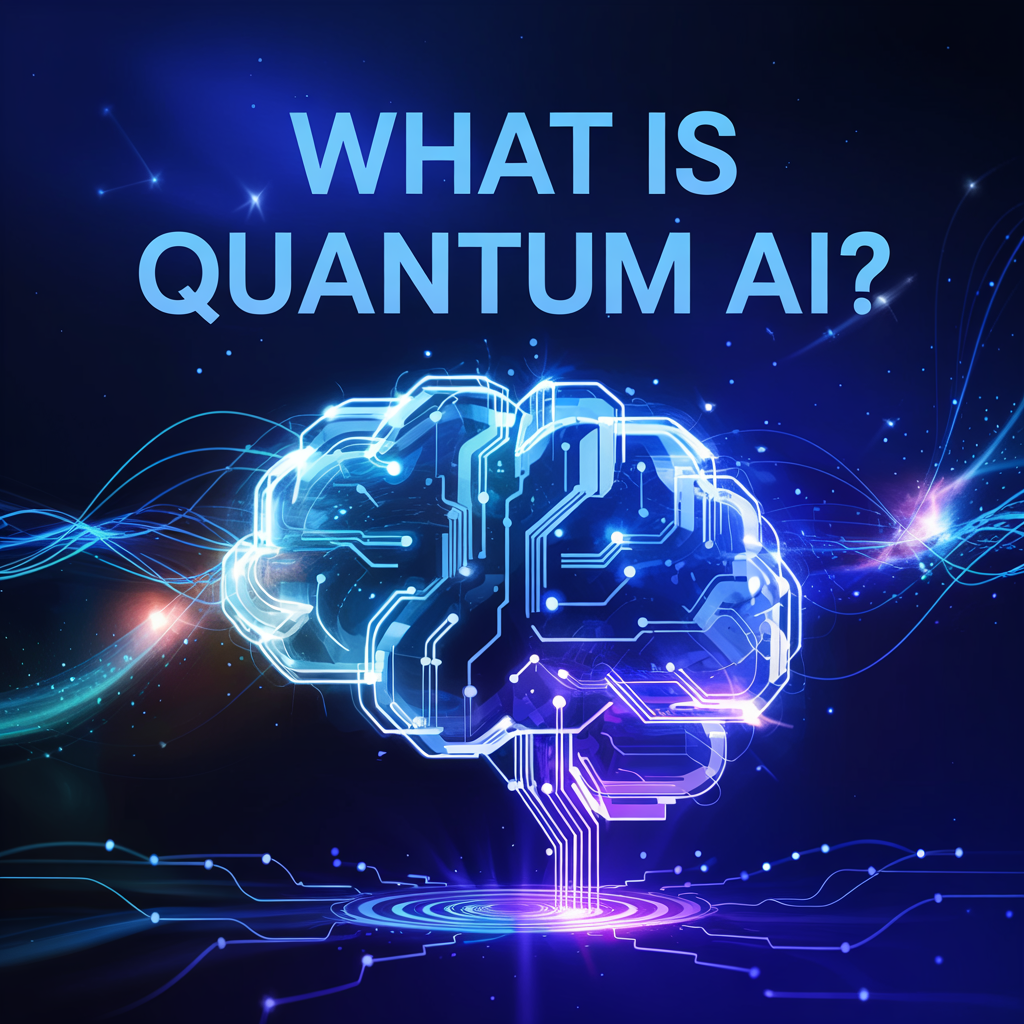The Paris 2024 Summer Olympics, from July 26 to August 11, isn’t just about medals and amazing talent. Indeed, we’ve seen shooters from Korea and Turkey display pinpoint accuracy, and Ukrainian fencers turn their matches into strategic contests. Meanwhile, sprinters from Jamaica and the United States run with incredible speed. The Games is a truly spectacular event to watch. Still, you’d be impressed to know what is happening behind the scenes—especially the involvement of technologies.
The technology has been woven into every part of the Games. This makes the entire experience more innovative and more engaging. From AI-driven broadcasting that brings every moment into our living rooms to digital platforms that offer fans a personalized, immersive experience, the tech side of the Olympics is working behind the scenes to make everything run smoothly.

In this blog, we will reveal the immense involvement of AI technology in the Paris 2024 Summer Olympics, exploring different cases of usage. Read on for valuable insights.
How is Technology Aligned with the Olympics?
No doubt the Olympics is celebrating the best of humanity. And who are we to deny it? But it’s clear that this year, it’s not just the athletes stepping up. AI at the Olympics is playing a huge role. For starters, the technology helps redefine how we connect with the Games.
As we examine how AI is powering Paris 2024, we’ll see that it’s not just supporting the action on the ground but also shaping the future of the Olympics. This ensures that athletes and fans can enjoy the show without being distracted by disruptions and lays the groundwork for this global event to continue to evolve and impress in the future. AI at the Olympics takes charge of this mission!
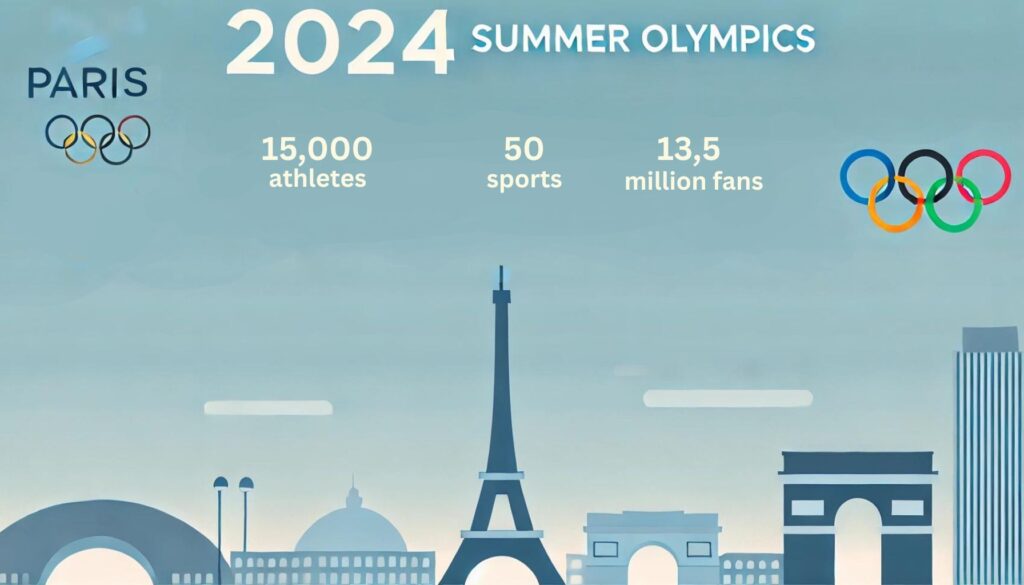
The Games aren’t just about the thrill of sports and competition; they’re also a huge media and entertainment event. From July 26th to August 11th, 2024, the Games will light up our screens, including our mobile devices, while making sure we don’t miss a moment. Atos, one of France’s top international IT companies supporting the event, describes the Games as “the biggest event ever organized in France,” with nearly 15,000 elite athletes competing in over 50 sports.
Jérôme Parmentier from the International Olympic Committee, speaking about how people watch the Olympics in the era of TikTok and Netflix, shared his thoughts in an interview with Warc: “In the last two Games, digital-only consumption was only 10-15%. I assume it will be higher this time, but how much higher is the question. We’ll know on 13 August. And I’m very optimistic also on advertisers – we see very positive signs in the US and in France as a host country.”
Atos has also revealed that 13.5 million tickets have been snapped up, and the Games will deliver more than 350,000 hours of TV coverage to keep billions of fans hooked. Christophe Thivet, Chief Integration Officer of the Paris 2024 Olympic and Paralympic Games, pointed out that this event is “simply too big to fail,” both for the athletes and the tech teams working behind the scenes. He adds, “Yet, while the Olympic Games are unique, the IT challenges they face mirror those faced by IT leaders in every sector. Namely, how to mobilise an agile, high-performing team and how to balance the drive to innovate with the need to tightly manage risk.”
How is AI Used in the Olympics?
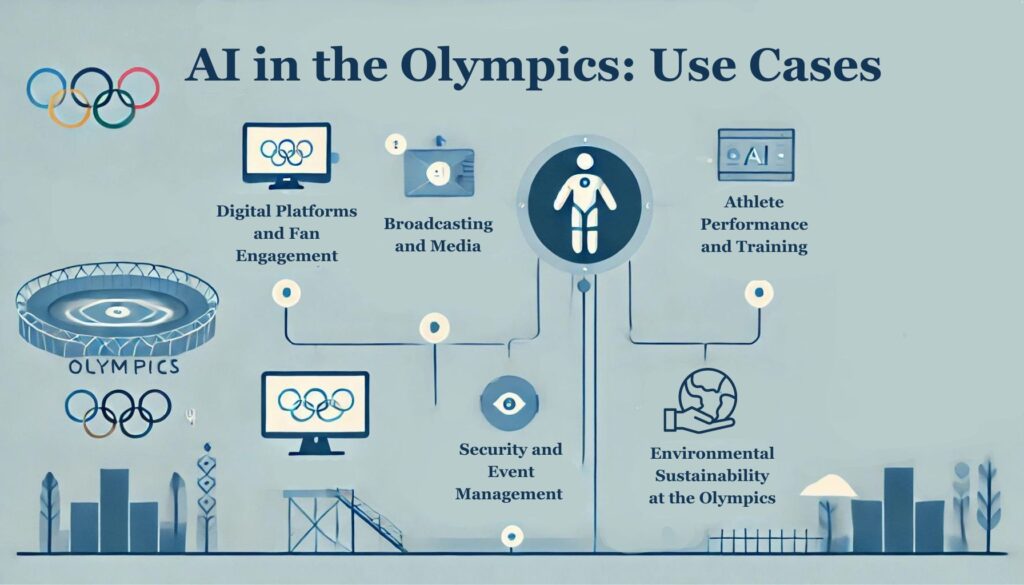
AI in Broadcasting and Media
AI at the Olympics gives viewers a more dynamic and personalized experience than ever before. With millions of fans tuning in from around the world, the demand for high-quality, real-time coverage is a must, and AI meets that demand head-on.
-
Enhancing Live Coverage
AI-powered cameras and automated production tools have revolutionized how the Games are broadcast. These smart cameras can track the action automatically, switch between different angles, and zoom in on key moments without the need for human intervention.
This technology allows broadcasters to deliver seamless, multi-angle coverage that captures every detail, whether the intensity of a close-up during a gymnastics routine or the broader view of a marathon route. This efficiency is crucial for an event as vast as the Olympics, where over 350,000 hours of content are expected to be broadcast globally.
-
Personalized Viewing Experience
AI in sports is changing how we watch the Olympics. Thanks to AI algorithms, viewers can now enjoy a highly personalized experience. Whether on TV, phone, or tablet, AI suggests events you might be interested in based on your viewing history, preferences, and even real-time trends.
For example, if you’re a fan of swimming, AI can recommend the top races, provide instant highlights, and even create custom reels of your favorite athletes. This kind of tailored content keeps viewers engaged and ensures they don’t miss out on what matters most to them. This shift is set to boost satisfaction and engagement.
-
Improved Accessibility
Real-time AI-generated captions and translations help break down language barriers and make the Games more accessible to a broader audience. It lets viewers from different parts of the world stay engaged. Moreover, AI-driven sign language avatars and audio descriptions for the visually impaired ensure everyone can enjoy the Olympics.
Focusing on accessibility isn’t just about being inclusive. It’s also a smart business move. Studies show that 71% of disabled people immediately leave inaccessible websites. Therefore, with accessibility features, AI boosts viewership while opening up new markets and increasing enjoyment.
AI in Digital Platforms and Fan Engagement
AI at the Olympics turns what used to be a passive viewing experience into something much more dynamic and personalized. By integrating AI across digital platforms, the Games are engaging fans and ensuring that everyone feels connected, whether in the stadium or on the other side of the world.
-
AI-Powered Websites and Mobile Apps
AI powers the official Olympic website and mobile apps to offer fans a seamless, user-friendly experience. These platforms have been set up to handle the massive influx of visitors, expected to reach millions daily. AI-driven chatbots are on hand 24/7 to answer questions, provide real-time updates, and help fans navigate schedules, venues, and athlete information.
These AI chatbots have already proven their worth in past events, and indeed, 62% of people tend to prefer bots over human agents. Whether you’re looking for the latest medal tally, information on your favorite athlete, or even tips on getting around Paris, AI-powered digital platforms are always available in your pocket for free.
-
Social Media and Content Creation
AI also boosts the Olympics’ social media presence. With billions of followers on platforms like Instagram, Twitter, and TikTok, AI tools manage content and analyze trends. They create posts, analyze trends, and craft messages for different audiences.
For example, AI in sports can track which events are trending in real time and push out highlights or updates to match the audience’s interests. Studies have shown that AI-powered content strategies can increase engagement by up to 50%. This happens because the technology ensures that the right content reaches the right people at the right time.
-
Immersive Experiences with AR/VR
AI makes fan experiences more innovative using augmented reality (AR) and virtual reality (VR). This way, it brings the Olympics closer to those who aren’t able to attend in person. Fans can take virtual tours or see the opening ceremony in AR, immersing them in the Olympic atmosphere.
AI at the Olympics helps customize these experiences based on user preferences. It offers virtual seats with the best view of the action or allows fans to explore behind-the-scenes areas usually off-limits to the public. This kind of immersive technology also creates new opportunities for sponsors and advertisers, who can reach a more targeted audience through these platforms.
The potential reach of these AR/VR experiences is immense, with the Deloitte research suggesting that 59% of Gen Z and 65% of millennial sports fans would pay to watch a VR sporting event from any seat at a venue.
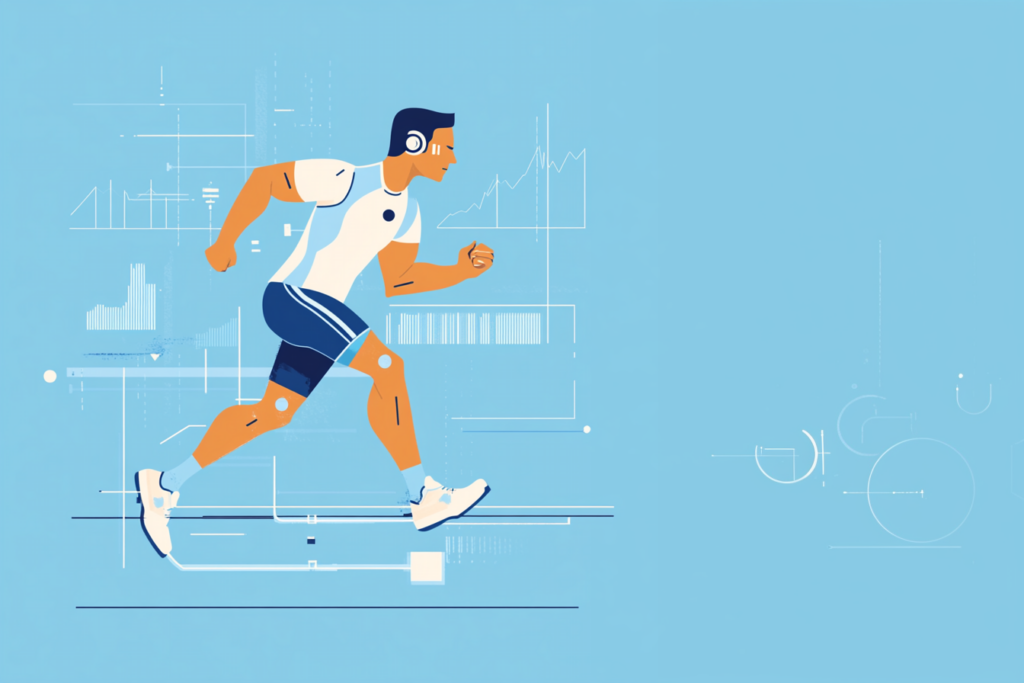
AI in Athlete Performance and Training
From training rooms to Olympic arenas, AI is now essential in sports. Athletes harness its power to fine-tune their performance at the Games. AI provides real-time feedback to sharpen athletes’ skills and optimizes training routines. Given the capabilities of this ‘digital coach,’ this is where human potential meets artificial intelligence, redefining athletic excellence.
-
Data-Driven Training Programs
Athletes are increasingly turning to AI for a competitive edge. AI-driven training programs analyze vast amounts of data—from past performances and body mechanics to environmental factors—providing athletes and coaches with valuable insights. This helps create personalized training plans and consequently maximizes each athlete’s potential.
For instance, AI in sports can analyze a sprinter’s running technique down to the millisecond, identifying inefficiencies in movement that could shave precious seconds off their time. A recent study found that athletes using AI analytics in their training improve their performance metrics by up to 30%.
Moreover, AI-powered wearables track everything from heart rate variability to muscle strain. They feed real-time data back to coaches who can adjust the intensity of AI-assisted training for Olympians. This not only boosts performance but also prevents injuries by highlighting risks early.
-
Real-Time Analytics During Events
Once the athletes hit the field, the role of AI doesn’t stop there. During the events, AI at the Olympics provides real-time analytics that can be a game-changer for both athletes and coaches. AI systems track an athlete’s performance, comparing it with past results and competitors in real time. This instant feedback allows coaches to swiftly adjust strategies and tactics, often becoming decisive in the game’s outcome.
In sports like cycling or rowing, where timing is critical, AI examines factors like speed, aerodynamics, and wind effects. It shares this data through wearable devices to help athletes make on-the-spot adjustments.
-
Ethical Considerations
While AI offers many benefits, it also raises some important ethical questions, particularly regarding fairness and access. Not everyone has equal access to advanced AI, which could create unfair advantages. There are also data privacy concerns, as these systems collect and process huge amounts of personal data.
The International Olympic Committee has been working to address these concerns by setting guidelines on the ethical use of AI in sports. They aim for greater transparency in how AI tools are used and advocate for wider access to ensure that all athletes, regardless of their background, can benefit from these advancements.
AI at the Olympics is reshaping how athletes train and compete. By delivering personalized AI-assisted training for Olympians, offering real-time insights during competitions, and helping prevent injuries, AI is empowering athletes to reach new heights. Yet, ensuring fairness and access remains crucial as AI becomes more common in sports. This step is vital to uphold the Olympic values of equality and excellence.
AI in Security and Event Management
As one of the world’s largest and most complex sporting events, the Paris 2024 Olympics requires top-notch security and flawless event management. Cutting-edge technology ensures clockwork precision, enhancing safety and satisfaction for attendees and participants alike. The event’s massive scale demands flawless execution, which AI at the Olympics delivers through seamless integration and advanced measures.
-
Enhancing Security Measures
Advanced AI transforms Olympics security in Paris 2024. One of the most significant applications is in surveillance and threat detection. Real-time video analysis flags suspicious behavior instantly. These systems can scan thousands of faces per second, matching them against databases to identify potential threats and flagging any anomalies that might indicate danger.
Facial recognition scans 30,000 faces hourly, achieving 99% accuracy. This not only helps keep out unauthorized individuals but also speeds up entry times. Beyond physical security, AI bolsters cybersecurity. It swiftly identifies and neutralizes digital threats, safeguarding vast Olympic data. Studies show that AI-powered systems cut cyber threat response times by up to 12%.
-
Streamlining Logistics and Operations
Imagine the chaos of 13.5 million spectators flooding Paris for the Olympics. Without AI, gridlock and shortages would reign. But smart algorithms tame this logistical beast. They predict peak times and optimize venue entry points to slash wait times.
AI-powered traffic systems cut travel delays by 20%, whisking athletes and officials through congested streets. Behind the scenes, predictive AI at the Olympics manages supply chains and boosts delivery efficiency by 10%. From transportation to ticketing, artificial intelligence silently orchestrates a seamless event experience. The result? A smoother, more efficient Olympics where fans and participants alike can focus on the thrill of competition.
-
Managing Environmental Impact
The Paris 2024 Olympics face a triple challenge: security, logistics, and environmental impact. On the security front, smart systems enhance crowd management and threat detection. Logistically, AI optimizes transportation and resource allocation.
Environmentally, AI slashes energy use by 20% through intelligent monitoring. AI systems monitor energy usage across venues, ensuring that they operate as efficiently as possible and helping to reduce the event’s carbon footprint. Predictive algorithms improve waste management, keeping venues spotless. This AI integration not only ensures smoother Games but also pioneers a new era of event management.
AI in Environmental Sustainability at the Olympics
AI at the Olympics powers the event’s green vision, marrying thrills with eco-conscious planning. These Games redefine sustainability for major events and prove athletic prowess and environmental stewardship can coexist.
-
Smart Infrastructure
As millions descend on Paris for the Olympics, AI takes center stage in a sustainability revolution. Venues use intelligent systems to optimize energy use in real time. Lights dim, temperatures adjust, and water flows precisely as needed. This slashes energy waste, shrinking the Games’ carbon footprint.
Meanwhile, smart algorithms manage transportation on city streets, guiding spectators, athletes, and officials through optimal routes. Traffic flows smoothly as eco-friendly vehicles glide by, guided by artificial intelligence. Thus, AI can lead to a 30% reduction in transport emissions. By harnessing technology’s power, the Games set a new gold standard for sustainable mega-events.
-
Waste Management and Resource Optimization
The Olympics generate a huge amount of waste, from food and packaging to discarded materials. AI’s predictive algorithms optimize collection, pinpointing when and where trash accumulates. Machine learning in Olympic sports sorts recyclables with a notable segregation accuracy rate of 97%. Food waste? AI at the Olympics analyzes consumption patterns and reduces excess.
These smart systems tackle packaging, discarded materials, and leftovers. As a result, it leads to streamlined waste management and increased recycling rates. AI transforms the Games’ environmental impact, turning a historically wasteful event into a model of sustainability.
-
Monitoring Environmental Impact
AI drives Paris 2024’s eco-friendly initiatives, monitoring environmental metrics in real time. It tracks air and water quality, emissions, and waste while enabling swift responses to emerging issues. When air quality dips, AI at the Olympics alerts prompt action like traffic rerouting or boosting public transit.
This technology ensures transparency by making environmental data public, fostering accountability and continuous improvement. Besides, AI optimizes energy use and waste management to meet sustainability targets.
Paris 2024 leverages AI to minimize its ecological footprint while maximizing spectacle. This innovative approach paves the way for future events to balance grandeur with sustainability, proving that technology can enhance both performance and environmental consciousness.
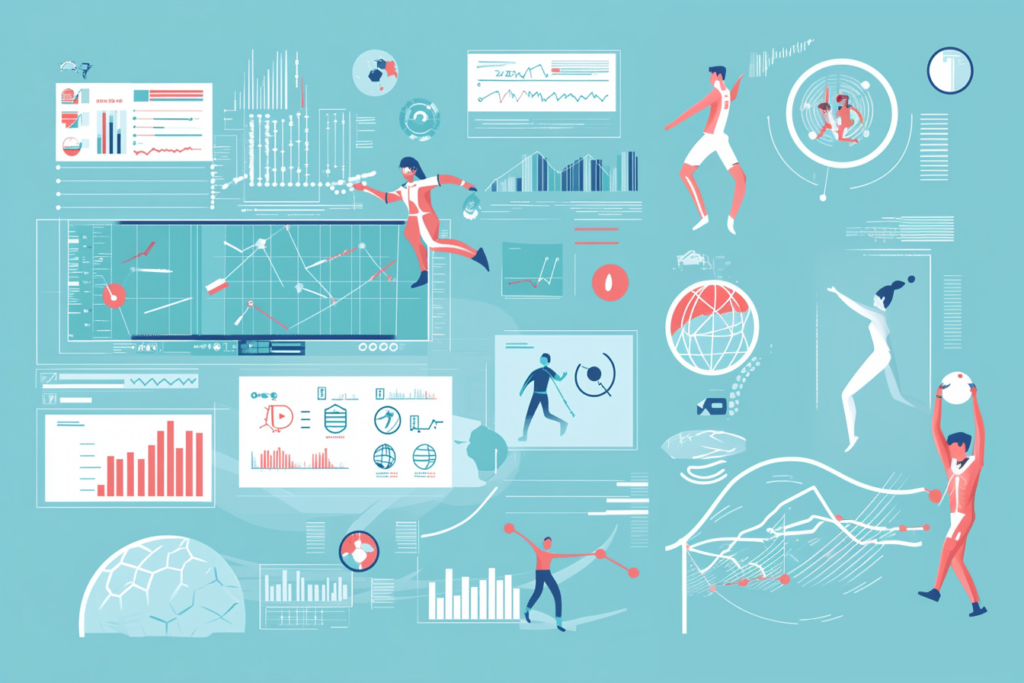
Can AI Be Used to Predict Sports?
AI can predict sports outcomes by analyzing vast amounts of data, from player statistics to weather conditions. Machine learning algorithms identify patterns and trends while offering AI-powered Olympic predictions that are often remarkably accurate—sometimes with up to 80% accuracy in football match outcomes.
AI in sports is widely used in betting and fantasy leagues, where it helps bettors and players make more informed decisions. However, it’s important to remember that the unpredictable nature of sports means no AI can guarantee outcomes, and there are ethical concerns around its use, particularly in betting.
The Future of AI at the Olympics
The Olympics are experiencing a game-changing revolution: artificial intelligence. At Paris 2024, AI transforms organization, spectator experiences, and memory preservation. As the technology’s influence expands, it pushes Olympic boundaries further. The integration of AI in sports promises to redefine what’s possible, offering a glimpse into tomorrow’s Olympics.
Evolving Fan Engagement
AI’s evolution promises to revolutionize Olympic fan engagement. Picture creating your own viewing schedule, blending highlights and interviews tailored to your tastes. This personalized approach could boost viewership for the next Games, especially among tech-savvy youth.
Broadcasters and sponsors stand to gain from targeted ads and content. As AI refines its ability to customize experiences, fans will connect with the Olympics in unprecedented ways, fostering deeper, more interactive relationships with the event.
Advancing Athlete Performance
Virtual reality fused with AI promises to revolutionize athletic training. By simulating competitive environments, these technologies could boost performance. Athletes may soon practice in hyper-realistic scenarios, honing their skills more efficiently than ever before.
Meanwhile, AI’s integration with biometric data is advancing rapidly. Real-time monitoring of stress and fatigue during training or competition could offer instant feedback, allowing athletes to adjust strategies on the fly. This precise, actionable data may reshape how athletes prepare and perform.
Enhancing Event Management and Sustainability
Imagine an Olympic Games where AI predicts and solves problems before they occur. Athlete transportation flows seamlessly, guided by real-time traffic analysis. Waste vanishes, managed by systems that halve landfill contributions. Security operates flawlessly, overseen by advanced algorithms. This future isn’t far off. As AI evolves, it will revolutionize Olympic management and sustainability.
From logistics to environmental impact, AI in sports promises near-perfect efficiency. Future Games will showcase technology’s power to streamline operations, reduce emissions, and enhance the overall experience. Thus, we’ll get smoother, greener, safer Olympics powered by artificial intelligence.
AI and Ethical Considerations
As AI becomes more ingrained in the Olympic ecosystem, ethical considerations will also emerge. Issues such as data privacy, fairness, and accessibility will need to be carefully managed to ensure that AI benefits all participants and stakeholders equally. Future Olympics will likely see the development of stricter guidelines and regulations governing the use of AI, ensuring that the technology is used responsibly and transparently.
Shaping the Olympic Legacy
AI’s integration promises to revolutionize future Olympics, enhancing fan experiences, athlete performance, and event logistics. By 2030, AI could hit $19.2 billion annually within the sports industry, with the Olympics leading this technological charge.
Yet AI’s role transcends mere numbers. It’s about crafting a new Olympic legacy that balances cutting-edge technology with timeless human achievement. As AI in sports reshapes competitions, it also redefines fairness and sustainability in sports.
The future Olympics, powered by AI, will likely be more engaging, accessible, and equitable. This evolution ensures the Games remain relevant in our fast-paced world. More importantly, it showcases how technology can amplify human potential and foster global unity. The Olympic flame, rekindled by AI, burns brighter than ever, illuminating a path where sports and innovation converge.
Wrapping Up
The Paris 2024 Olympics blends tradition with cutting-edge AI technology. Behind the scenes, artificial intelligence is revolutionizing broadcasting, fan engagement, athlete performance, and event management. AI personalizes experiences, boosts efficiency, and enhances sustainability, setting new standards for large-scale events.
As we look ahead, AI’s potential in the Olympics seems limitless, promising innovative enhancements. Yet, we must balance progress with ethical considerations, upholding fairness, inclusivity, and the Olympic spirit. Smart technology at the Paris 2024 Olympics intertwines with human achievement, inspiring global audiences.
Want to learn more about AI in different sectors? Read our blog!
FAQ
How is AI being used to enhance the fan experience at the Olympics?
AI enhances the fan experience by offering personalized recommendations, interactive features, and real-time updates through mobile apps and digital platforms. Fans can receive tailored content, explore immersive experiences like AR/VR, and engage more deeply with the Games.
What are some challenges of integrating AI into the Olympics?
Some challenges include ensuring data privacy, managing the ethical implications of AI use, and providing equal access to advanced AI tools for all participating countries. Balancing innovation with fairness and transparency is crucial to maintaining the integrity of the Games.
How is AI expected to evolve in future Olympic Games?
AI is expected to become even more integrated into all aspects of the Olympics, from enhancing athlete training and performance analytics to creating more personalized and immersive fan experiences. Future developments may also focus on improving sustainability and event management efficiency.
How does AI contribute to the overall management of the Olympic Games?
AI contributes by optimizing logistics, coordinating transportation, and managing resources efficiently. It helps streamline operations, predict and solve problems in real time, and ensure that the Games run smoothly, even with the massive scale and complexity involved.
How can other industries learn from AI’s use in the Olympics?
Other industries can learn from AI’s application in the Olympics by observing how it improves efficiency, enhances customer experiences, and manages large-scale operations. Industries such as event management, sports, and media can adopt similar AI strategies to optimize their own processes and engage more effectively with their audiences.



